 |
|
Israel Journal COLLEEN TINKER |
||||
NUMBER 6 — SUNDAY, NOVEMBER 2, 2008
Harod's Spring, Beth Shean, Jerash, and Ammon
Wow! It's hard to summarize or to articulate the experiences of today. This morning we left Tiberias and drove south toward the Jordan border crossing. On the way our Israeli guide, a bright, articulate, fountain-of-knowledge Jewish woman who is native to South Africa but emigrated to Israel several decades ago talked about the landmarks we were passing and also gave us some of the details of the agreement between Israel and Jordan for the use of the Jordan River's water.
Her repeated point was that the wars or disagreements in this region are over water, nothing else. The Judean desert is truly arid, and even the more temperate elevations in Israel and the surrounding areas have been drought-plagued for the last several years. The Jordan is at its lowest point in years (if not in history), and the Sea of Galilee is also lower than anyone remembers it being in recent history.
In fact, the day before we came, there had been a significant rainstorm that was just clearing out when we arrived in the country. Our guide kept telling us it was the answer to the fervent prayers of the Israelis. We also learned today that the rain had soaked Jordan—which also needs it.
Herod's Spring
On the way south, we stopped at a most interesting and lovely spot: the Spring of Harod. This spring is definitely the very place where God reduced Gideon's army from over 2,000 to only 300 men. Remember the story? Those who were afraid could go home. Two-thirds of the volunteers who had answered Gideon's call left. Then God said to take the men to the spring of Harod; those who lapped like dogs would remain; those who knelt to drink should be sent home. 300 men lapped up the water—probably by dipping a hand into the spring and drinking rapidly.
The area of the spring of Harod is exceptionally beautiful. While I know the cultivated trees and flowering shrubs and the gem-like park across from the spring are planted, still the climate and the moisture mean that trees and greenery were plentiful there even in Gideon's time. In my head I'd never pictured that spring as anything but an arid desert setting. (I don't know what I was thinking...!)
Also visible from Harod’s Spring was Mt. Moreh directly across the Jezreel Valley. It was Mt. Moreh to which Saul sneaked past the Philistines encamped in the Jezreel Valley to consult the witch of Endor. Seeing the lay of the land, visualizing Saul’s desperation for a word of insight that prompted him to pass enemy territory to deliberately disobey God emphasized the desperation which drives those who choose to shut out the true word of God.
Gary and Elizabeth both pointed out that during the time of the judges, of which Gideon was one, Israel experienced the spiral of seven cycles of sin:
- Sin: They did what was evil.
- Servitude: When they fell into sin, the surrounding pagan nations put them back under bondage.
- Supplication: They would finally become weary of their oppression and cry to God for relief—not necessarily in true repentance but in remorse.
- Salvation: Through the obedience of a prophet or a judge, God would deliver Israel again from the spiral of sin and bondage.
- Sustenance: God would sustain them for as long as they were faithful to Him—until the next time they spiraled into sin, servitude, supplication, and salvation yet again.
I found it amazing to be a the very place Gideon "received" his army—and water is still flowing there, and it is still fresh and good to drink. I did put my hand into it and taste it!
Beth Shean
Our last stop in Israel was ruins of the classical city Beth Shean. It was awesome to walk among the excavated columns, pavements, and buildings of a city that was first a Hellenstic Greek city, then it was added to by Rome, and finally during the Byzantine era it was built up more before falling into disrepair as the result of a great earthquake.
Beth Shean was one of the ten cities that composed the Decapolis; it had a temple to Diana in it. They early church grew rapidly in cities just like Beth Shean. In OT times, Beth Shean was in a slightly different location, but it was essentially the same city. It was here that, when Saul and his sons all died in the same battle, the Philistines took their bodies and impaled them on the city walls. The Israelites in Gilead heard about the humiliation and came and took Saul's bones to give them a proper burial.
We sat in the theater open to the sky, and Michael Hicks sang "You Are God Alone" in that place where honor had been given for centuries to pagan gods.
Across the border in Jordan
The border crossing was an interesting experience. We all made it, though, and were none the worse for wear, even though there were some procedures that surprised everyone because protocol changes frequently. We had to change busses to a Jordanian bus with a new Jordanian driver and a new Jordanian guide. Our new guide for these three days has been doing official Jordanian tour guiding for 13 years, and he has a B.A. in English from a Jordanian university.
We drove through the Jordanian countryside for about two hours until we got to Jerash. When we first arrived, we stopped for lunch at the Green Valley Restaurant. We had only one choice for a meal, but it was delicious. The restaurant itself was very cute, with tile floors, rooms partly open to the outdoors, and ceilings that looked like bamboo poles laid side-by-side with light shining between. The meal consisted of fresh-baked flatbread that must have been at least 13 or 14 inches in diameter served with hummus, a spicy hot relish, olives, and chopped cucumber and tomato and parsley salad. The main course was called "mixed grill", and it included seasoned and roasted chicken, lamb, and beef (or veal) pieces. Yum!
Singing at Jerash
We spent the rest of the daylight touring the ruins and excavations/renovations being done at the ancient Hellenistic city of Jerash. This ancient city is breathtaking. We enter it through Hadrian's Gate—an enormous arched gate built by the Ropman emperor Hadrian in honor of his visit to that part of the land in 129 AD. (He is also responsible for Hadrian's Gate in Britain.)
Jerash was originally a Hellenistic city also, and over the centuries the later Greeks and then the Romans built and added to it. Jerash is the most complete and extensive classical city in this part of the world, and it, too, was one of the ten cities that comprised the Decapolis. The city covers a large territory and included a temple to Zeus, currently under renovation and not able to be entered, and a massive outdoor theater that seated over 7,000 people.
A group of Jordanian musicians were performing when we entered the theater, playing bagpipes and drums in the classic manner they have inherited from their forefathers who were taught by the British when they were in the area in the late 19th century. Our guide spoke to them, and they stepped aside for Michael Hicks to sing—this time, he sang "Amazing Grace", all three stanzas. The acoustics are perfect, and Michael sang that song of grace not only to our group but to other visitors there who were non-Christians.
The bagpipers stepped up as soon as Michael finished and began to play "Amazing Grace" as well, moving seamlessly into Yankee Doodle Dandy and another folk song.
When the music was finished, the sun was beginning to set. The sky in Jerash was unbelievably clean and clear with the exception of a few puffy clouds; the sunset was beautiful, and the ruins were spectacular in the pink light.
As we began to hike down the mountain from the theater, every mosque in the modern city of Jerash just east of the ruins began their sunset prayers. Each mosque has speakers on its minaret to broadcast audibly the prayers being chanted inside; from the hill at the top of the ruins, the sound of the chanted prayers being broadcast over the city from each mosque, each at a slightly different cadence and place in the liturgy (since they didn't all start at the same moment) was startling. As one of our group members said as we walked toward the bus, "You can't capture that sound in a picture."
Ammon, Jordan
We got into our busses and drove to Amman where we're spending the night in the Intercontinental Jordan reputed to be Jordan's first 5-star hotel. Tomorrow morning we leave and will stay at the ancient Roman city of Petra for two nights, four hours away.
It was a day of almost confusing contrasts; I've been struggling to integrate all the information I'm seeing/hearing. The great beauty of Jerash and Beth Shean brought images of Paul preaching in the great Gentile cities that looked like these. The memory of his sermon on Mars Hill to the Athenians recorded in Acts 17 superimposes onto my mental images of the great oval hub of Jerash, paved and surrounded by Ionian columns and overlooked by the temple of Zeus.
The work to which the Lord Jesus called Paul was unbelievably difficult: to preach the one true, triune God and to introduce Jesus the Son who became flesh, died, and rose again on the third day and grants life and eternal salvation to all who believe.
I find myself praying for our guides and drivers who are hearing the gospel from Gary and Elizabeth. Of course, they've heard it before; they are not novices to leading tours of Christ-followers through the Holy Land. But we know that God is the One who softens hearts and cracks them open to know Jesus, and He is still doing today what He did over 2000 years ago when Paul preached in Hellenistic cities all over the Middle East and Aisa Minor and Southern Europe.
I'm still struggling to recover from the jet lag; today was better than yesterday, but Richard has already fallen asleep, and I keep waking myself up. It's 11:08 PM here, and I've got to go get some sleep.
Copyright 1999-2008 Graphics Studio, Redlands, CA USA. All rights reserved. Revised November 17, 2008. Use of this site and forum signifies your acceptance of the Terms and Conditions. Send comments and questions to formeradventist@gmail.com
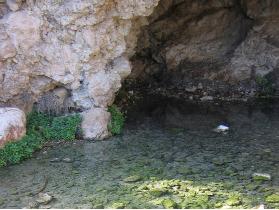
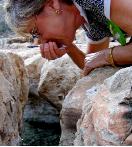
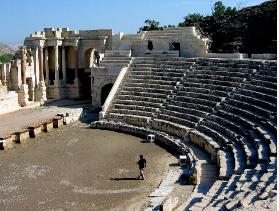 The theater at Beth Shean, one of the ten cities that composed the Decapolis. Michael Hicks sang "You Are God Alone" in this place built to honor pagan gods.
The theater at Beth Shean, one of the ten cities that composed the Decapolis. Michael Hicks sang "You Are God Alone" in this place built to honor pagan gods.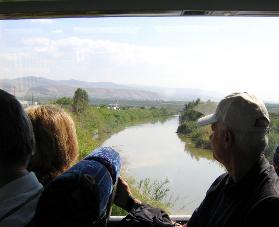 Our bus crosses the Jordan River into the Hashemite Kingdom of Jordan.
Our bus crosses the Jordan River into the Hashemite Kingdom of Jordan.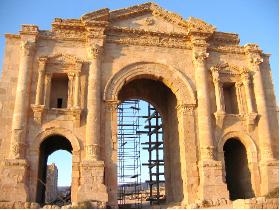 Hadrian's Gate was built to honor the Roman emperor Hadrian on his visit to Jerash.
Hadrian's Gate was built to honor the Roman emperor Hadrian on his visit to Jerash.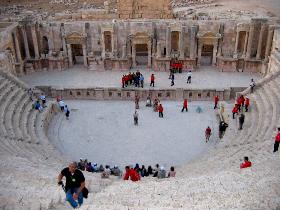 The theater of Jerash was changed to a worship venue as Michael Hicks sang "Amazing Grace". The Jordanian bagpipers responded by playing "Amazing Grace" and then moving to "Yankie Doodle".
The theater of Jerash was changed to a worship venue as Michael Hicks sang "Amazing Grace". The Jordanian bagpipers responded by playing "Amazing Grace" and then moving to "Yankie Doodle".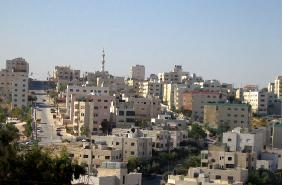 Amman, Jordan
Amman, Jordan